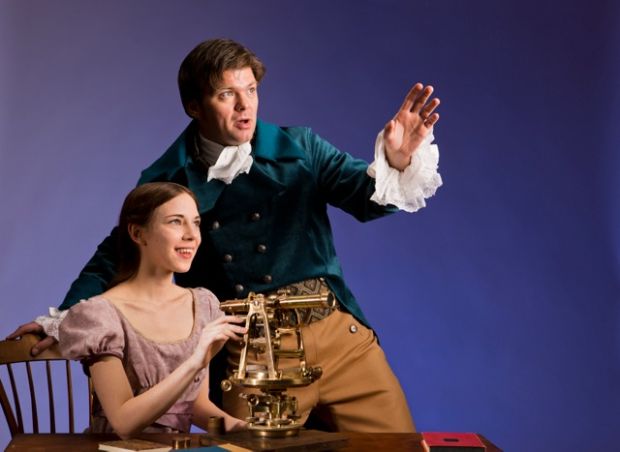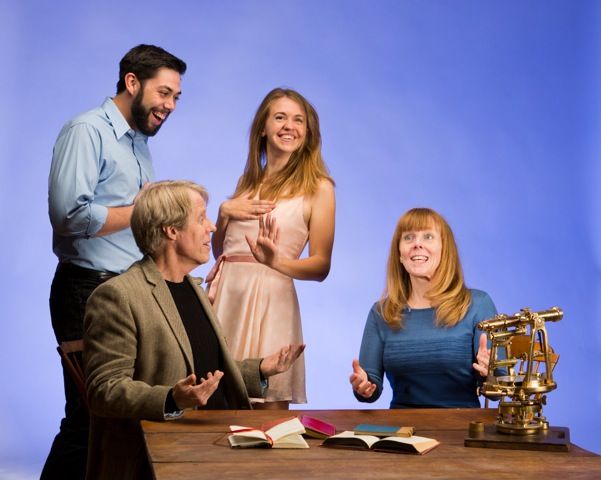Do not be afraid.
Sure, Tom Stoppard’s “Arcadia,” which The Rogue Theatre opens in previews tonight, sounds intimidating. After all, it bounces between two centuries, touches on mathematics and physics, and is wordy.
But the overriding theme in “Arcadia,” says director Cynthia Meier, is passion.
“This play is full of such passion for knowing,” she says.
“All of those characters have a desire to know something, to understand something. They are all so passionate, whether it’s math or Lord Byron or literature or sex. They all want to understand their world.”
Recapping the plot is, well, kind of impossible. But here’s an attempt:
It opens in 1809 England. In a lordly estate, young teen Thomasina studies with her tutor, Septimus, who happened to go to school with poet Lord Byron. Thomasina is a genius and keeps her notebooks filled with mathematical equations and her take on the chaos theory. And she peppers Septimus with questions. One: “What is carnal knowledge?”
Jump to present day, same estate. Thomasina’s notebooks are pored over, a scholar begins to explore the idea that Byron was once at the estate, a writer is researching a book on “the nervous breakdown of the Romantic imagination,” and all sorts of assumptions about the past are made. Those assumptions are wildly off-base. We know this because the play keeps taking us back in time; the audience knows what happened.
“Arcadia” operates on two levels, Meier says.
“It’s a detective story of what they knew in the 19th century — you can get lost in the weeds of what are fractals, get bogged down in details. But the other level the play exists on, regardless of what the characters are trying to discover, you get involved in their passion to discover.”
This is all done with lush language — Stoppard is gloriously wordy, yet not one is superfluous. They are woven together into a sort of music.
Still, says Meier, her task is to make sure that the right words are emphasized.
You approach a Stoppard play the way a Shakespeare is approached, she says. “If you emphasize every single word, you’ll never understand the verse. … The tricky thing is to not color all words with the same emphasis. We have to find the moments that people need to cling to.”
A reminder: Do not be afraid.
“I think people who know the play are a little intimidated by it because there’s so much to get,” says Meier. Her advice: Take in the whole and don’t worry about the details. “It’s like looking at a painting,” she says. “Instead of looking at the brushstrokes, look at the whole. I’ll think you’ll enjoy it a lot more.”
Sure, “Arcadia,” which snagged Tonys and other awards since its 1993 premiere, is a heady play; The Rogue has a soft spot for those.
But, Meier emphasizes, the play has a heart, too. And if the math flies right by you, the passion will surely stick.
The last scene in the play underscores that, she says, giving the scene away and swearing it’s not a spoiler:
The audience knows that Thomasina died in a fire right before her 17th birthday.
“At the end of the play, you see her wanting to learn to waltz,” says Meier. “There is this poignancy about it — it’s important to know things and learn things. But it is also important to dance.”
Meier hopes the audience leaves with the same sense she has after rehearsals:
“I come home from rehearsal full of wonder for the human mind — that we are capable of thinking about such wonderful things,” she says.
“There are parts about math and science, but also about the power of poetry. I come away thinking about the vastness of life, and how wonderful it is. It’s such a wonderful time to be alive. .... The play is inspiring; it makes you remember there’s a big, wonderful world out there worthy of discovery. You don’t have to be a genius to appreciate that.”





